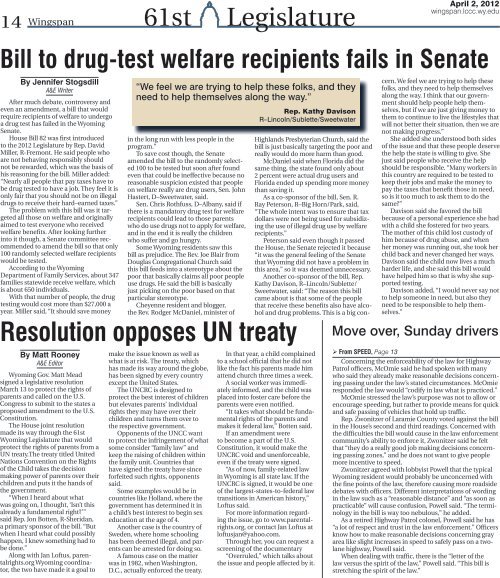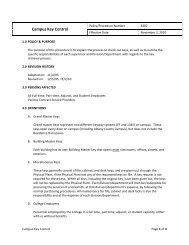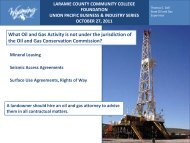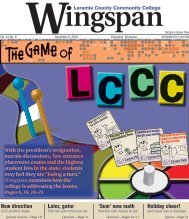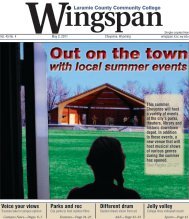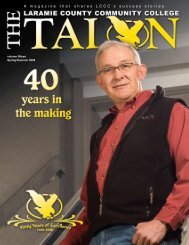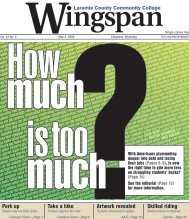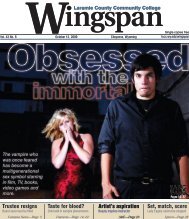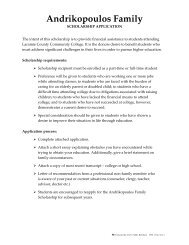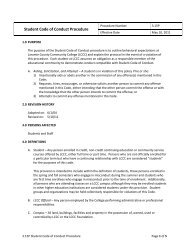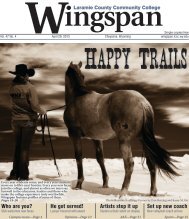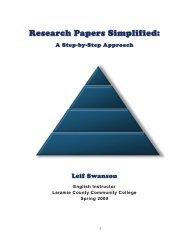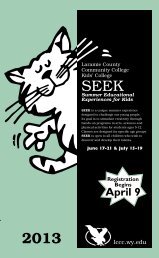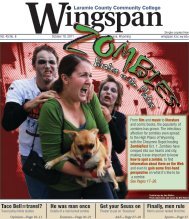Page 1.indd - Wingspan
Page 1.indd - Wingspan
Page 1.indd - Wingspan
- No tags were found...
Create successful ePaper yourself
Turn your PDF publications into a flip-book with our unique Google optimized e-Paper software.
14<strong>Wingspan</strong>61stLegislatureApril 2, 2012wingspan.lccc.wy.eduBill to drug-test welfare recipients fails in SenateBy Jennifer StogsdillA&E WriterAfter much debate, controversy andeven an amendment, a bill that wouldrequire recipients of welfare to undergoa drug test has failed in the WyomingSenate.House Bill 82 was first introducedto the 2012 Legislature by Rep. DavidMiller, R-Fremont. He said people whoare not behaving responsibly shouldnot be rewarded, which was the basis ofhis reasoning for the bill. Miller added:“Nearly all people that pay taxes have tobe drug tested to have a job. They feel it isonly fair that you should not be on illegaldrugs to receive their hard–earned taxes.”The problem with this bill was it targetedall those on welfare and originallyaimed to test everyone who receivedwelfare benefits. After looking furtherinto it though, a Senate committee recommendedto amend the bill so that only100 randomly selected welfare recipientswould be tested.According to the WyomingDepartment of Family Services, about 347families statewide receive welfare, whichis about 650 individuals.With that number of people, the drugtesting would cost more than $27,000 ayear. Miller said, “It should save moneyBy Matt RooneyA&E EditorWyoming Gov. Matt Meadsigned a legislative resolutionMarch 13 to protect the rights ofparents and called on the U.S.Congress to submit to the states aproposed amendment to the U.S.Constitution.The House joint resolutionmade its way through the 61stWyoming Legislature that wouldprotect the rights of parents from aUN treaty.The treaty titled UnitedNations Convention on the Rightsof the Child takes the decisionmaking power of parents over theirchildren and puts it the hands ofthe government.“When I heard about whatwas going on, I thought, ‘Isn’t thisalready a fundamental right?’”said Rep. Jon Botten, R-Sheridan,a primary sponsor of the bill. “Butwhen I heard what could possiblyhappen, I knew something had tobe done.”Along with Jan Loftus, parentalrights.orgWyoming coordinator,the two have made it a goal to“We feel we are trying to help these folks, and theyneed to help themselves along the way.”in the long run with less people in theprogram.”To save cost though, the Senateamended the bill to the randomly selected100 to be tested but soon after foundeven that could be ineffective because noreasonable suspicion existed that peopleon welfare really are drug users, Sen. JohnHastert, D–Sweetwater, said.Sen. Chris Rothfuss, D–Albany, said ifthere is a mandatory drug test for welfarerecipients could lead to those parentswho do use drugs not to apply for welfare,and in the end it is really the childrenwho suffer and go hungry.Some Wyoming residents saw thisbill as prejudice. The Rev. Joe Blair fromDouglas Congregational Church saidthis bill feeds into a stereotype about thepoor that basically claims all poor peopleuse drugs. He said the bill is basicallyjust picking on the poor based on thatparticular stereotype.Cheyenne resident and blogger,the Rev. Rodger McDaniel, minister ofResolution opposes UN treatymake the issue known as well aswhat is at risk. The treaty, whichhas made its way around the globe,has been signed by every countryexcept the United States.The UNCRC is designed toprotect the best interest of childrenbut elevates parents’ individualrights they may have over theirchildren and turns them over tothe respective government.Opponents of the UNCC wantto protect the infringement of whatsome consider “family law” andkeep the raising of children withinthe family unit. Countries thathave signed the treaty have sinceforfeited such rights, opponentssaid.Some examples would be incountries like Holland, where thegovernment has determined it ina child’s best interest to begin sexeducation at the age of 4.Another case is the country ofSweden, where home schoolinghas been deemed illegal, and parentscan be arrested for doing so.A famous case on the matterwas in 1982, when Washington,D.C., actually enforced the treaty.Rep. Kathy DavisonR–Lincoln/Sublette/SweetwaterIn that year, a child complainedto a school official that he did notlike the fact his parents made himattend church three times a week.A social worker was immediatelyinformed, and the child wasplaced into foster care before theparents were even notified.“It takes what should be fundamentalrights of the parents andmakes it federal law,” Botten said.If an amendment wereto become a part of the U.S.Constitution, it would make theUNCRC void and unenforceable,even if the treaty were signed.“As of now, family-related lawin Wyoming is all state law. If theUNCRC is signed, it would be oneof the largest-states-to-federal lawtransitions in American history,”Loftus said.For more information regardingthe issue, go to www.parentalrights.org,or contact Jan Loftus atloftusjan@yahoo.com.Through her, you can request ascreening of the documentary“Overruled,” which talks aboutthe issue and people affected by it.Highlands Presbyterian Church, said thebill is just basically targeting the poor andreally would do more harm than good.McDaniel said when Florida did thesame thing, the state found only about2 percent were actual drug users andFlorida ended up spending more moneythan saving it.As a co-sponsor of the bill, Sen. R.Ray Peterson, R–Big Horn/Park, said,“The whole intent was to ensure that taxdollars were not being used for subsidizingthe use of illegal drug use by welfarerecipients.”Peterson said even though it passedthe House, the Senate rejected it because“it was the general feeling of the Senatethat Wyoming did not have a problem inthis area,” so it was deemed unnecessary.Another co-sponsor of the bill, Rep.Kathy Davison, R–Lincoln/Sublette/Sweetwater, said: “The reason this billcame about is that some of the peoplethat receive these benefits also have alcoholand drug problems. This is a big concern.We feel we are trying to help thesefolks, and they need to help themselvesalong the way. I think that our governmentshould help people help themselves,but if we are just giving money tothem to continue to live the lifestyles thatwill not better their situation, then we arenot making progress.”She added she understood both sidesof the issue and that these people deservethe help the state is willing to give. Shejust said people who receive the helpshould be responsible. “Many workers inthis country are required to be tested tokeep their jobs and make the money topay the taxes that benefit those in need,so is it too much to ask them to do thesame?”Davison said she favored the billbecause of a personal experience she hadwith a child she fostered for two years.The mother of this child lost custody ofhim because of drug abuse, and whenher money was running out, she took herchild back and never changed her ways.Davison said the child now lives a muchharder life, and she said this bill wouldhave helped him so that is why she supportedtesting.Davison added, “I would never say notto help someone in need, but also theyneed to be responsible to help themselves.”Move over, Sunday drivers‣ ¾From SPEED, <strong>Page</strong> 13Concerning the enforceability of the law for HighwayPatrol officers, McOmie said he had spoken with manywho said they already make reasonable decisions concerningpassing under the law’s stated circumstances. McOmieresponded the law would “codify in law what is practiced.”McOmie stressed the law’s purpose was not to allow orencourage speeding, but rather to provide means for quickand safe passing of vehicles that hold up traffic.Rep. Zwonitzer of Laramie County voted against the billin the House’s second and third readings. Concerned withthe difficulties the bill would cause in the law enforcementcommunity’s ability to enforce it, Zwonitzer said he feltthat “they do a really good job making decisions concerningpassing zones,” and he does not want to give peoplemore incentive to speed.Zwonitzer agreed with lobbyist Powell that the typicalWyoming resident would probably be unconcerned withthe fine points of the law, therefore causing more roadsidedebates with officers. Different interpretations of wordingin the law such as a “reasonable distance” and “as soon aspracticable” will cause confusion, Powell said. “The terminologyin the bill is way too nebulous,” he added.As a retired Highway Patrol colonel, Powell said he has“a lot of respect and trust in the law enforcement.” Officersknow how to make reasonable decisions concerning grayarea like slight increases in speed to safely pass on a twolanehighway, Powell said.When dealing with traffic, there is the “letter of thelaw versus the spirit of the law,” Powell said. “This bill isstretching the spirit of the law.”


